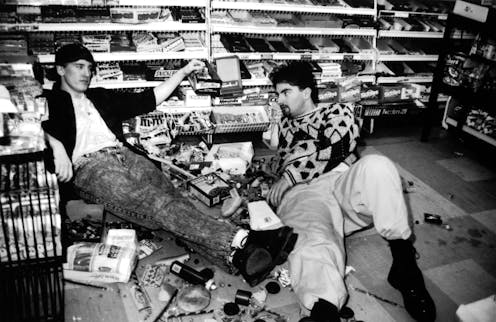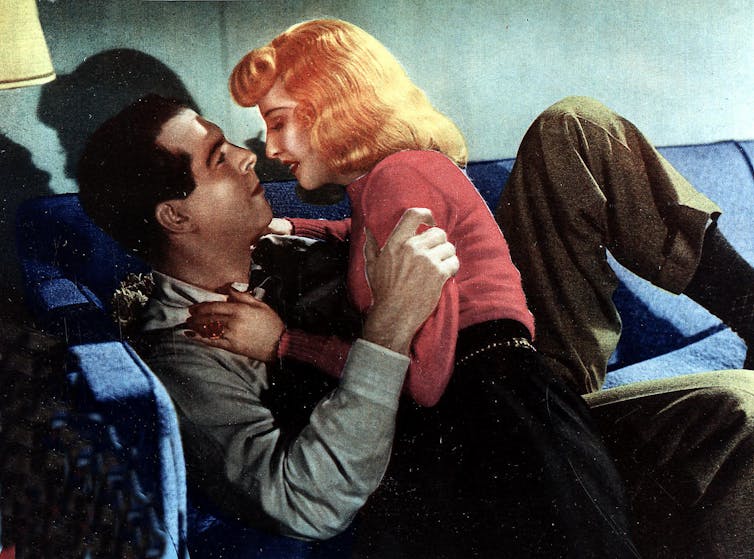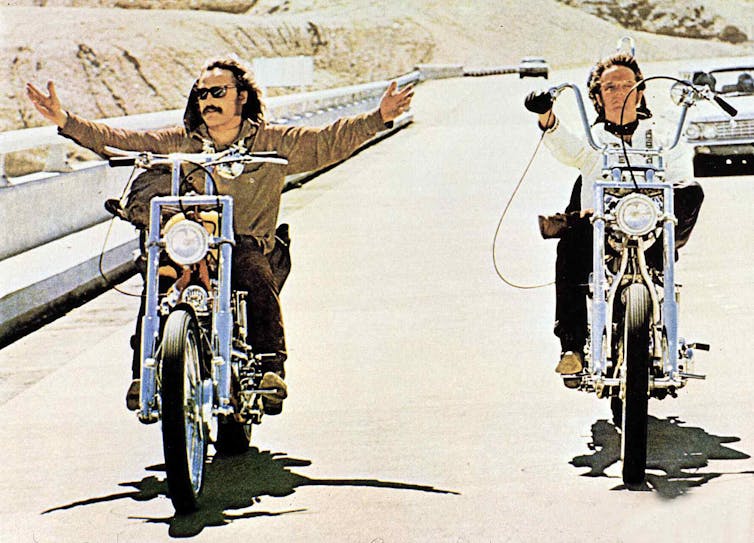'Great resignation'? 'Quiet quitting'? If you’re surprised by America’s anti-work movement, maybe yo
A range of films spanning different eras confronts viewers with the same question: ‘What if all that hard work isn’t really worth it?’

A femme fatale who tries to con thousands through her lover’s insurance company. Jobless bikers on drug-fueled adventures in New Orleans. People smashing printers at work.
Watching movies like “Double Indemnity,” “Easy Rider” and “Office Space,” you might think Americans had never heard of the Protestant work ethic – the spirit of sacrifice and delayed gratification that helped build capitalism.
Films like these reveal that many Americans’ current anti-work sentiments may not be all that new. As someone who has researched and taught world literature and cinema for over a decade, I believe some of the most fascinating movies make viewers ask, “What if all that hard work isn’t really worth it?”
The pandemic and the ‘Great Resignation’
Since the pandemic, more Americans than ever have been asking that same question.
During what some have termed the “Great Resignation,” many Americans changed careers, quit bad jobs or refocused on life away from work. More recently, the trend of “quiet quitting,” or doing only what one is paid for, has blown up on social media. The phrase is a bit misleading, as one does not quit one’s job. Instead, workers refuse to hustle in the workplace, especially since going “above and beyond” often means working for free.
The recent wave of quiet quitting comes from a deeper, more long-term disengagement with stressful work environments, unfulfilling roles and, despite recent wage hikes, the inability of paychecks to keep up with the cost-of-living crisis for many working and middle-class families.
Ironically, the drive to hyperproductivity that some argue is a central feature of capitalism is at an all-time high. Workers are told that if they “do what they love,” work should never feel like a burden. Some theorists compare modern forms of work culture, especially in Silicon Valley, to a religion in their attempts to instill people with passion and meaning.
These developments have created a pushback, especially among younger generations, toward work-life balance, flexible schedules and a deeper focus on mental health.
But some people have gone even further, with philosophers questioning the very foundations of an achievement-based society that lends itself to rampant burnout and depression. Political theorists and the anti-work movement are asking how it might be possible to create more free time for everyone, not just those who can afford to quit or take a job where they’ll earn less money.
Crime as an alternative to work
Yet such anti-work sentiments are nothing new to American culture.
It was arguably Charlie Chaplin’s characters that first expressed the anti-work ethos, most famously in the 1936 film “Modern Times,” in which his character works too slowly at an assembly line and gets caught in the cogs of a giant machine.
Around World War II, crime became an allegory for an anti-work ethos: little effort, big payoff.
The film noir genre often explores the existential and psychological factors that drive people to crimes of passion.
Many noir films feature a femme fatale – that is, a woman who seduces men as part of a larger criminal plot for her to get ahead financially. This character type often speaks to a cultural fear around what women might do to remedy their domestic and workplace dissatisfaction.
For instance, in “Double Indemnity” (1944), Phyllis Dietrichson, who’s unhappily married to an older, wealthy man, seduces insurance salesman Walter Neff. They concoct a plot to stage her husband’s murder as an accident and collect his life insurance money. A similar crime of passion against a wealthy husband also takes place in “The Postman Always Rings Twice” (1947).

Joseph H. Lewis’ “Gun Crazy” (1950) charts the story of Bart and Laurie, who “can’t live on 40 bucks a week.” They embark on a string of robberies that allows them to live job-free for a time. After Bart learns that Laurie killed two people, he turns remorseful, exclaiming, “Two people dead – just so we can live without working!”
Youth rebellion and the counterculture
With the arrival of the 1950s, the anti-work ethos becomes associated with youth culture.
A new generation of “hoodlums,” hippies and dropouts is a poor fit for the traditional workplace, beginning with the leather-jacket clad, motorcycle-riding Marlon Brando in “The Wild One” (1953) and James Dean in “Rebel Without a Cause” (1955).
“Easy Rider” (1969) follows two unemployed bikers who, after a lucrative drug deal, stop at a New Mexico commune and admire the self-sustaining economy there. They continue toward New Orleans and meet Jack Nicholson’s George Hanson, who tells them, “It’s real hard to be free when you are bought and sold in the marketplace.”
Hanson goes on to contrast America’s world of work to the freedom of a hypothetical alien species with no leaders and no money. The counterculture is crystallized.

Slackers and sabotage
In 1990s popular culture, a “slacker” ideal took hold.
The apathetic, unemployed or underemployed young person appears in films such as “Dazed and Confused” (1993), “Reality Bites” (1994), “Friday” (1995) and “The Big Lebowski” (1998).
Richard Linklater’s “Slacker” (1990) follows a series of unemployed people, hustlers and moochers around Austin, Texas, in their nonworking time. One of these men says, “To hell with the kind of work you have to do to earn a living. … I may live badly, but at least I don’t have to work to do it.” He ends with the rousing proclamation: “To all you workers out there – every single commodity you produce is a piece of your own death!”
However, the slacker doesn’t merely try to work as little as possible. Some seek to actively sabotage the workplace. In “Clerks” (1994), two workers are intentionally rude toward customers. They play hockey on a rooftop and go to a friend’s wake during work hours.
“Office Space” (1999) follows three workers, who, frustrated with their company’s malfunctioning printer, decide to take a baseball bat to it before infecting the office computers with a virus.
And in “Fight Club” (1999), Tyler, played by Brad Pitt, sneaks pornographic clips into family films while working as a projectionist. The narrator, played by Edward Norton, describes Tyler as a “guerrilla terrorist of the food service industry” after Tyler “seasons” plates of food at a fancy hotel with his various bodily fluids.
Recent cinema shifts to overt anti-capitalism
The 21st century has witnessed the rise of a whole series of foreign films and TV shows with explicitly anti-capitalist themes, with dramas like “Money Heist” (2017) “Parasite” (2019) and “Squid Game” (2021) centered on the characters’ fight against economic inequality.
This trend is evident in American cinema, too.
In “Sorry to Bother You” (2018), workers are so desperate for economic security that they sell themselves into slavery at a company called “WorryFree.” The satire follows Cassius Green, an African American telemarketer who, in his desire to rise up the corporate ladder, cuts deals with international companies to use WorryFree’s slave labor. While not as explicitly anti-capitalist, Chloé Zhao’s “Nomadland” (2020) paints a portrait of America where jobs are increasingly seasonal, temporary and insecure, leaving people adrift as “nomads.”
Americans have long had a vexed relationship to work, seeing it as alienating, exploitative or simply without real payoff.
Hustle culture and “grinding” might still dominate in America. However, more theorists are now arguing that technological automation and major social change could lead to a world beyond work with more free time for all.
It is therefore more important than ever to pay attention to what these films say: Perhaps work does not hold the key to happiness, fulfillment and the good life.
Zen Dochterman does not work for, consult, own shares in or receive funding from any company or organization that would benefit from this article, and has disclosed no relevant affiliations beyond their academic appointment.
Read These Next
Taboo tics like shouting curses and slurs are uncommon in Tourette syndrome − but people who have th
Obscene language tics, called coprolalia, don’t reveal what people with Tourette’s think and feel.…
Why ICE’s body camera policies make the videos unlikely to improve accountability and transparency
For body cameras to function as transparency tools, wrongdoing would have to be consistently penalized,…
Honoring Colorado’s Black History requires taking the time to tell stories that make us think twice
This year marks the 150th birthday of Colorado and is a chance to examine the state’s history.






